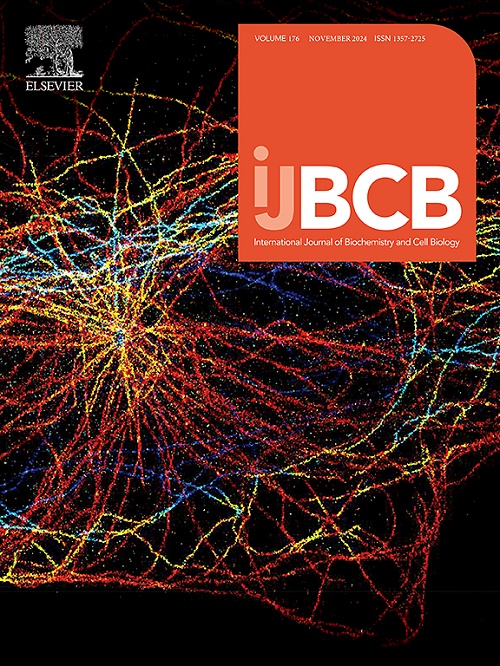母亲高脂肪饮食诱导的后代肥胖:通过增加热休克蛋白介导的脂肪组织功能障碍
IF 2.8
3区 生物学
Q2 BIOCHEMISTRY & MOLECULAR BIOLOGY
International Journal of Biochemistry & Cell Biology
Pub Date : 2025-06-11
DOI:10.1016/j.biocel.2025.106812
引用次数: 0
摘要
孕妇孕前和怀孕期间的体重和饮食对后代的代谢健康有重大影响,尽管对孕妇营养过剩在代谢和脂肪组织适应方面的性别差异仍未充分了解。本研究利用母体高脂肪饮食诱导肥胖小鼠模型,评估了性别二态性对后代肥胖、生理和脂肪组织功能的影响。与雌性后代相比,HF饲粮喂养的雄性后代表现出更大的体重增加和肥胖,葡萄糖稳态受损,血清胰岛素、瘦素和胆固醇水平升高,白色脂肪组织中脂肪生成和热休克蛋白(HSPs)基因表达增加。在独立于实验动物的已建立的脂肪细胞系中,在分化过程中,白色脂肪细胞的热休克蛋白表达高于棕色脂肪细胞。此外,Hsp90ab1在人脐带间质干细胞中的表达倾向于在男性婴儿中与母亲体重指数呈正相关,而在女性婴儿中则没有。这一发现是独立于动物模型产生的,旨在加强我们工作的翻译视角。总之,这些结果表明母亲的饮食、热蛋白和脂肪组织功能之间存在潜在的联系。本文章由计算机程序翻译,如有差异,请以英文原文为准。
Maternal high-fat diet-induced obesity in offspring: Unraveling adipose tissue dysfunction mediated by increased heat shock proteins
Maternal weight and diet before and during pregnancy have a substantial impact on offspring metabolic health, though sex-specific differences in metabolic and adipose tissue adaptations to maternal overnutrition remain insufficiently understood. Using a mouse model of maternal high-fat (HF) diet-induced obesity, this study assessed the sexually dimorphic responses on offspring adiposity, physiology, and adipose tissue function. Male offspring of HF diet-fed dams exhibited greater weight gain and adiposity, impaired glucose homeostasis, elevated serum levels of insulin, leptin, and cholesterol, along with increased adipogenic and heat shock proteins (HSPs) gene expression in white adipose tissue compared to female offspring. In established adipocyte cell lines independent of experimental animals, the expression of HSPs during differentiation was higher in white than in brown adipocytes. Also, expression of Hsp90ab1 in human umbilical cord mesenchymal stem cells tended to positively correlate with maternal body mass index in male, but not in female infants. This finding was generated independently of the animal model and were intended to strengthen the translational perspective of our work. Together, these results suggest a potential link between maternal diet, HSPs, and adipose tissue function.
求助全文
通过发布文献求助,成功后即可免费获取论文全文。
去求助
来源期刊
CiteScore
8.10
自引率
0.00%
发文量
124
审稿时长
19 days
期刊介绍:
IJBCB publishes original research articles, invited reviews and in-focus articles in all areas of cell and molecular biology and biomedical research.
Topics of interest include, but are not limited to:
-Mechanistic studies of cells, cell organelles, sub-cellular molecular pathways and metabolism
-Novel insights into disease pathogenesis
-Nanotechnology with implication to biological and medical processes
-Genomics and bioinformatics

 求助内容:
求助内容: 应助结果提醒方式:
应助结果提醒方式:


